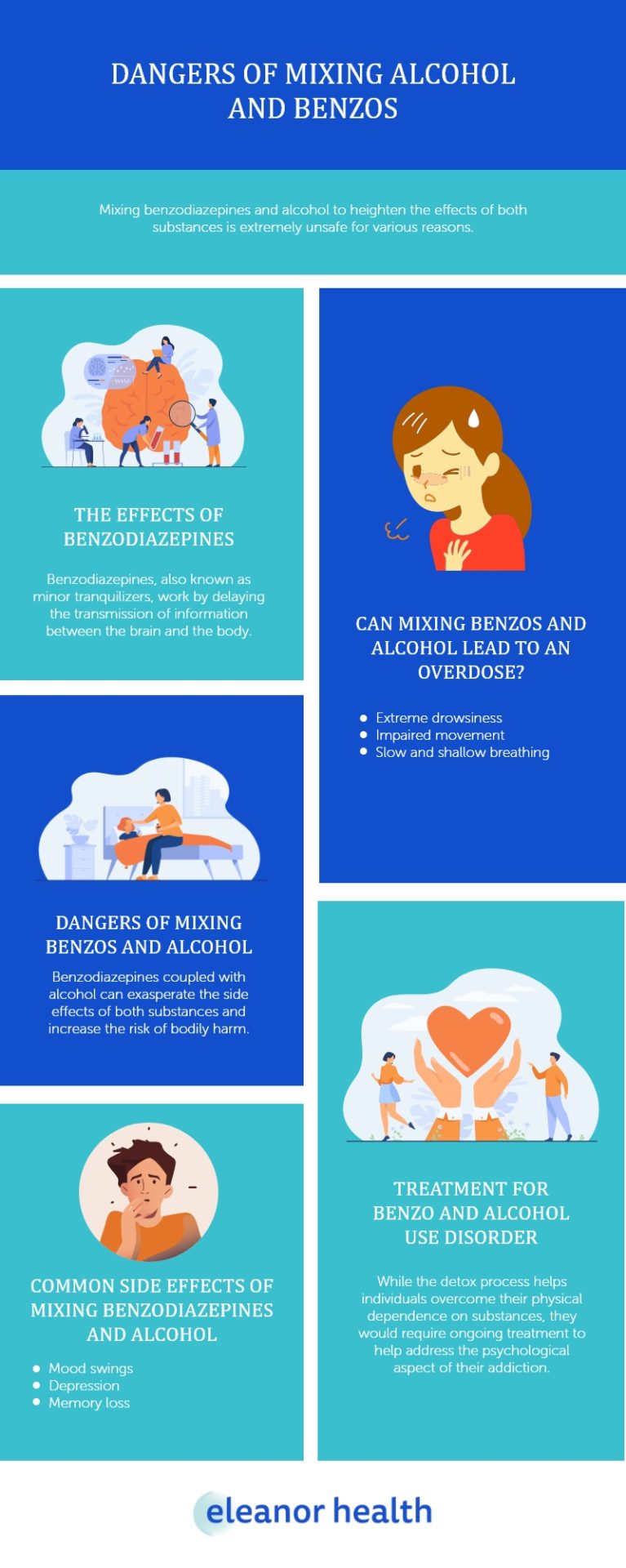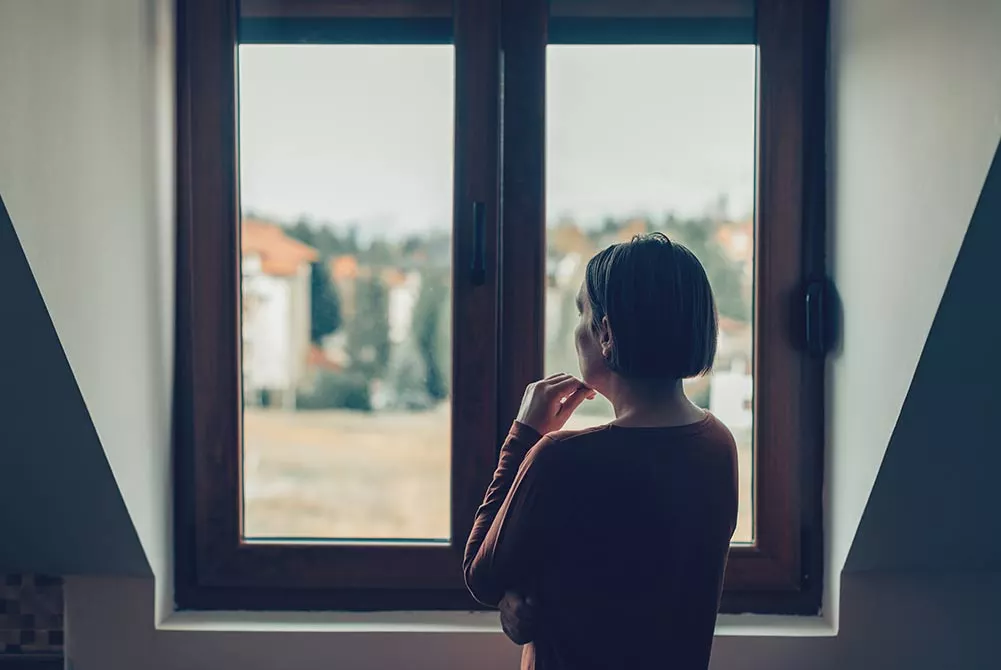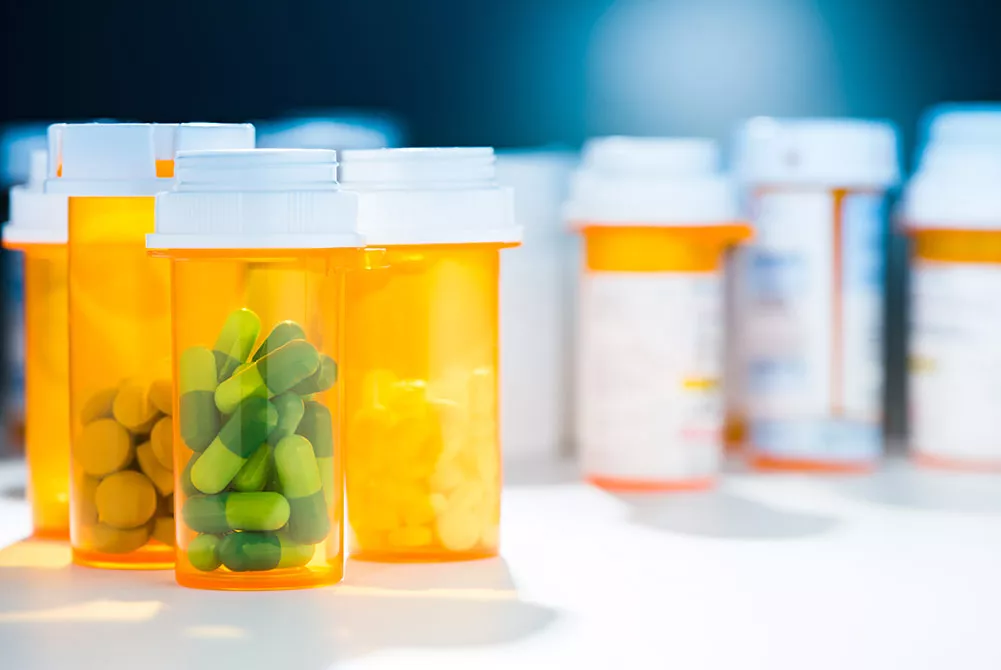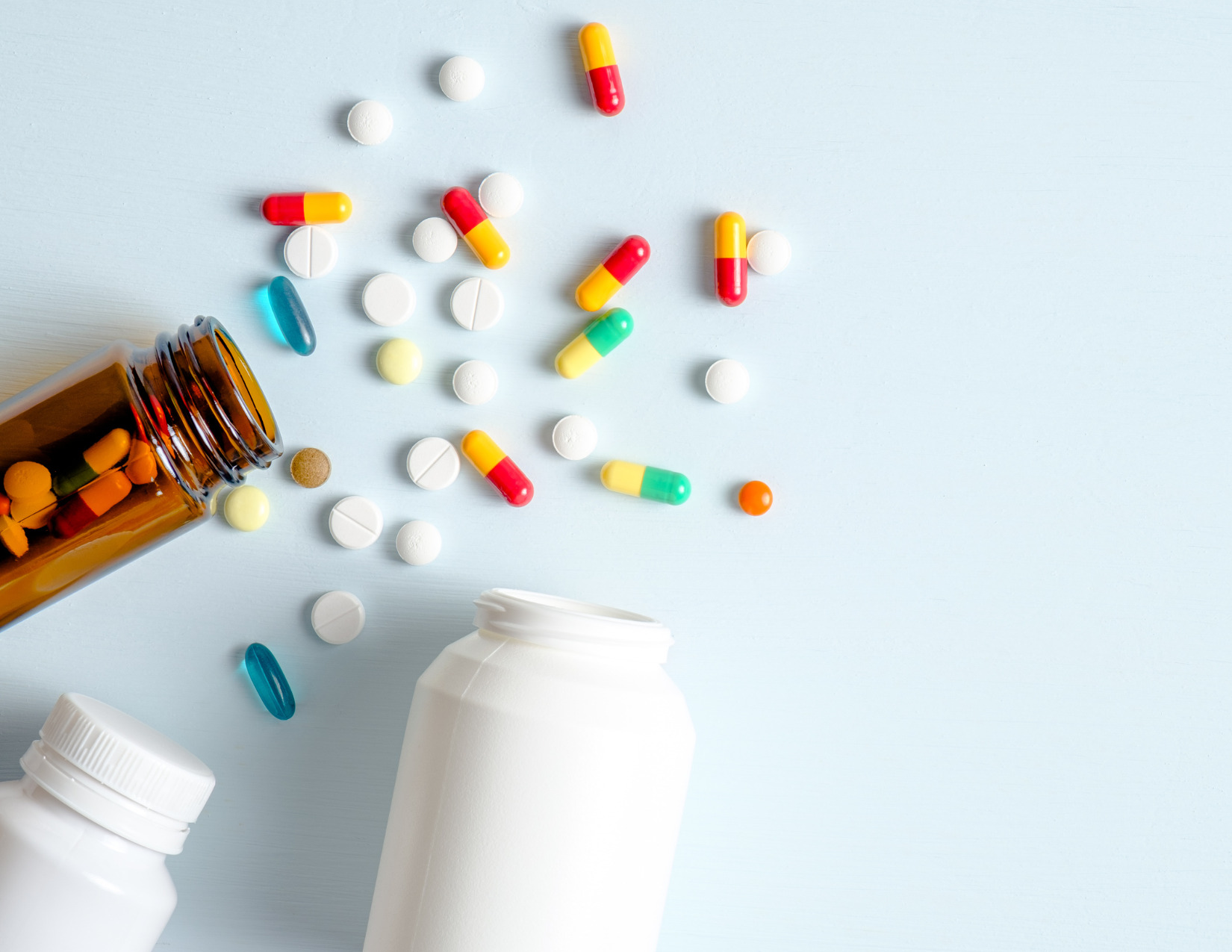Benzodiazepines (commonly known as benzos) are sedative medications used to treat anxiety, stress, insomnia, and acute alcohol withdrawal symptoms. Benzodiazepines are one of the most widely prescribed medications in the United States. According to the National Center for Health Statistics (NCHS), benzodiazepines are prescribed at around 66 million doctor’s appointments each year.
Tolerance (the requirement for higher and more frequent doses to achieve the same effect), withdrawal symptoms, misuse, and dependence have all been linked to long-term benzodiazepine use. However, despite the long-term ramifications, the number of adults in the United States who misuse benzodiazepine prescriptions has steadily increased. Benzodiazepines possess a high risk of misuse, addiction, and overdose, especially in people who have a history of polysubstance dependence.
The most common misuse of benzodiazepines is in combination with opioids or alcohol. Mixing benzodiazepines and alcohol to heighten the effects of both substances is extremely unsafe for various reasons, the most serious of which is the potential risk of a coma or lethal overdose. In addition, since both substances are depressants, which can depress your central nervous system to dangerously low levels, misusing them together increases your chances of bodily harm, dangerous behavior, and possibly death.
Benzodiazepines, also known as minor tranquilizers, work by delaying the transmission of information between the brain and the body. Benzos work by influencing a specific brain chemical known as gamma-aminobutyric acid, a neurotransmitter. These neurotransmitters are chemical messengers that carry, boost, and balance signals between nerve cells. Neurotransmitters are responsible for the vast majority of human behavior in one way or another.
GABA is an inhibitory neurotransmitter, which prevents neurons in the brain and spinal cord from responding. As a result, benzodiazepines reduce brain activity by boosting the effects of GABA and slowing physiological nerve impulses.
Although over 2,000 various benzodiazepines have been developed, only about 15 have been approved by the FDA in the United States. These benzodiazepines are usually categorized depending on the duration of their effects, such as ultra-short acting, short-acting, and long-acting.
Although benzodiazepines are beneficial in treating a wide range of medical and psychological disorders, they should be used cautiously, especially when recommended to those with a history of substance misuse.
Benzodiazepines are classified as a schedule IV controlled substance with a potential for misuse and are frequently misused in combination with other substances rather than by themselves.
When you combine any medication with alcohol, you’re increasing your chances of experiencing negative effects. So it’s important to consult your doctor about any medications you’re taking.
Benzodiazepines are generally safe when taken as prescribed, but when combined with alcohol, they can be dangerous. Benzodiazepines coupled with alcohol can exacerbate the side effects of both substances and increase the risk of bodily harm.
Benzos and alcohol can both seriously affect your central nervous system and immune system, leading to severe organ failure and death over some time. Unfortunately, combining the two substances also raises your chances of becoming addicted to both, causing you to take more of each to achieve the same effect: a circumstance that frequently leads to a lethal overdose.
Apart from the potentially fatal implications, combining these two substances reduces your inhibitions and increases your chances of engaging in dangerous behavior that can disrupt your relationships with family and friends.
Benzodiazepines and alcohol are both depressants, which means they slow down the central nervous system. When benzos and alcohol are mixed, the depressive effects of both are amplified and become much more life-threatening. The following are some of the most common side effects of this combination:
Even if these two substances are combined only occasionally, mixing alcohol with benzodiazepines can be harmful. When these two substances are used together regularly, they can cause various short and long-term side effects. These ramifications include difficulties with an individual’s overall life satisfaction and everyday functioning, in addition to potentially serious health complications.
Mixing benzos with alcohol amplifies their side effects and increases the risk of overdose. This combination can result in irreversible damage to a person’s cognitive functions, such as memory and emotional control, and catastrophic organ damage. As a result, the risk of an overdose is highly likely to occur when using two different depressants together.
Symptoms of a benzo and alcohol overdose include:
Individuals experiencing symptoms of an overdose must seek immediate medical attention to avoid fatal consequences.

Treatment for benzo addiction and alcohol use disorder begins with recognizing the problem and reaching out for help. The first step in treating concurrent benzodiazepine and alcohol misuse is detoxification, a process by which the body is biologically weaned off addictive substances.
According to the American Society of Addiction Medicine (ASAM), there are three goals of detoxification:
Detoxification procedures differ from person to person depending on the intensity of withdrawals. Some people may require a gradual tapering regimen, in which benzodiazepine dosages are gradually reduced over a certain period, while others may require a medication-assisted detox program. While the detox process helps individuals overcome their physical dependence on substances, they would require ongoing treatment to help address the psychological aspect of their addiction. These treatment programs are provided through an inpatient or outpatient facility.
With the growing concern of mental health disorders and substance misuse during the Covid-19, one must remain vigilant and cautious of their substance use. Relapses, unintentional overdoses, and problematic substance usage have occurred due to isolation, even among people who had never had a problem before. Everyone is affected by the COVID-19 epidemic. However, the risks are greater for individuals with substance use disorders or amid treatment. Reach out to a physician or addiction specialist if you’re struggling with substance misuse so they could provide you with information about regulatory changes and treatment options available during this time.
What is respiratory depression, and why is it dangerous when mixing benzos and alcohol?
Respiratory depression is a serious condition where breathing becomes dangerously slow and shallow. The interactions between alcohol and benzos can severely depress the central nervous system, potentially leading to respiratory failure. This dangerous combination requires immediate medical attention.
Why do medical professionals warn against mixing prescribed benzodiazepines with alcohol?
Medical professionals emphasize that combining prescription drugs like benzodiazepines with alcohol creates a dangerous combination that can lead to severe adverse effects. This mixture can not only intensify side effects and increase the risk of overdose, but it can also increase the risk of developing a dependence on both substances.
Can mixing benzos and alcohol worsen anxiety disorders?
Yes. While benzodiazepines are prescribed to treat anxiety disorders like generalized anxiety disorder (GAD) and panic disorder, combining them with alcohol can worsen anxiety symptoms and lead to dangerous side effects. The combination can also interfere with the therapeutic benefits of prescribed benzodiazepines.
What are the signs of alcohol dependence when using benzodiazepines?
How does this combination affect cognitive function?
The combination of benzos and alcohol significantly impairs judgment and cognitive function. This impairment can lead to poor decision-making, increased risk-taking behavior, and potentially dangerous situations that put both the user and others at risk.
What are the most commonly misused benzodiazepines?
The most frequently misused benzodiazepines are Xanax (alprazolam), particularly due to its rapid onset and potency, Valium (diazepam) for its longer-lasting effects, Klonopin (clonazepam), and Ativan (lorazepam) for its quick-acting properties.
These prescription drugs are especially dangerous when combined with alcohol, as both substances enhance each other’s sedative effects. Medical professionals strongly advise against using these medications in any way other than prescribed, as misuse significantly increases the risk of adverse effects and potential overdose.
What mental health concerns can arise from mixing alcohol with benzos?
Mixing alcohol with benzodiazepines can lead to severe mental health complications beyond their immediate effects. These include:
The combination can create a dangerous cycle where individuals may use one substance to cope with the negative mental health effects of the other. This pattern often leads to worsening symptoms and can complicate both addiction treatment and mental health recovery. It’s crucial to work with medical professionals to address both substance use and mental health concerns through proper treatment channels.
For more information on addiction treatment options and regulations during Covid-19, visit Substance Abuse and Mental Health Services Administration (SAMHSA), National Institute on Drug Abuse (NIDA), or American Psychological Association (APA).
If you are seeking help with your loved one’s addiction, contact us today or complete our quick contact form below, to speak with an addiction treatment specialist.
If you need help with your substance use disorder, we are here to help you build your confidence and momentum towards the future you want. We provide treatment services for adults with alcohol, opioid, and other substance use disorders. We are currently located in Louisiana, Massachusetts, New Jersey, North Carolina, Ohio, Texas, and Washington.
 Identifying and Treating Symptoms of Benzodiazepine Withdrawal
Identifying and Treating Symptoms of Benzodiazepine Withdrawal
 What are Benzos?
What are Benzos?
 Medications for Anxiety and Depression: An Essential Medication Guide
Medications for Anxiety and Depression: An Essential Medication Guide